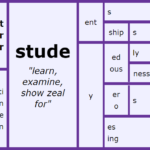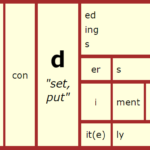I recently came across a tweet in a Twitter conversation that argued that studying morphemes is not always helpful. A morpheme is the smallest unit of meaning in a language. All words consist of at least one morpheme. As a structured word inquirer, I clearly think studying morphemes is helpful, and the example of <reply> piqued my interest. (The original tweeter, Tricia Miller, has since deleted all her tweets in the conversation, so I am unable to share links to the original tweets anymore.)
“Meaning comes first so we use only words the learners know the meaning of. It’s not always helpful for spelling isolate morphemes. In ‘recommend’ it is. In ‘reply’ it’s not. Wisdom and flexibility are key.”
A follow-up tweet further argued against studying the morphology of <reply>: “‘Reply’ doesn’t lend itself as easily to a morphological approach because the meaning of ‘ply’ is too obscure to make it a good tool for remembering how to spell the word.”
I could not fathom the reason not recognizing the <re> suffix in <reply>. I would think of four other words that contain the <ply> base off the top of my head:
apply
imply
multiply
ply~pliable~pliant
Obscure is an adjective that means “relatively unknown, not readily understood or clearly expressed.” Five common words does not seem very “obscure” to me.
Diving into Etymonline, I discovered that the <ply> base in <reply> comes from the Latin <plicare> “to lay, fold, twist.” Latin <plicare> came from Proto-Italic <*plekt->, which came from Proto-Indo-European root <*plek-> meaning “to plait.” The PIE <*plek-> developed into <ply> along with <plice>, <plex>, <ploy>, and a handful other other related words. (I also discovered that the <ply> in <comply> and <supply> comes from a different root, PIE *pele- meaning “to fill,” which I plan to study in a later post.)
accomplice
applicate~application~applicant~applicable
complicate~complication~complicity
duplicate~duplicity
explicate~explicit
implicate~implication~implicit
multiplication~multiplicand
replica~replicate~replication
triplicate
complex~complexion
duplex
implex
perplex~perplexity
simplex
plexus
deploy
employ
display~splay
exploit
flax
plait
plash
pleat
plie
plight
The base <ply> and its relatives are not obscure by any meaning of the word. Heck, I have 2-ply toilet paper in my bathroom right now. The toilet paper is folded in two. Two folds. 2-ply.
But should obscurity even matter? Is the point of learning to uncover only unobscure things? I think not. Learning should reveal the truth, fully and accurately.
<ply>
“lay, fold, twist,” from the Latin plicare, from Proto-Italic *plekt-, from Proto-Indo-European root *plek- “to plait”
Word Sums
ap + Ply -> apply
ap + Ply + es -> applies
ap + Ply + ed -> applied
ap + Ply + ing -> applying
mis + ap + Ply -> misapply
mis + ap + Ply + es -> misapplies
mis + ap + Ply + ed -> misapplied
mis + ap + Ply + ing -> misapplying
pre + ap + Ply -> preapply
pre + ap + Ply + es -> preapplies
pre + ap + Ply + ed -> preapplied
pre + ap + Ply + ing -> preapplying
re + ap + Ply -> reapply
re + ap + Ply + es -> reapplies
re + ap + Ply + ed -> reapplied
re + ap + Ply + ing -> reapplying
ap + Ply + er -> applier
ap + Ply + er + s -> appliers
ap + Ply + ance -> appliance
ap + Ply + ance + s -> appliances
ap + Ply + able -> appliable
ap + Ply + ant -> appliant
ap + Ply + ant + s -> appliants
im + Ply -> imply
im + Ply + es -> implies
im + Ply + ed -> implied
im + Ply + ing -> implying
im + Ply + ed + ly -> impliedly
im + Ply + er -> implier
im + Ply + er + s -> impliers
non + im + Ply +ed -> nonimplied
un + im + Ply + ed -> unimplied
mult + i + Ply -> multiply
mult + i + Ply + es -> multiplies
mult + i + Ply + ed -> multiplied
mult + i + Ply + ing -> multiplying
mult + i + Ply + ing + s -> multiplyings
mult + i + Ply + er -> multiplier
mult + i + Ply + er + s -> multipliers
mult + i + Ply + able -> multipliable
un + mult + i + Ply + able -> unmultipliable
de + mult + i + Ply -> demultiply
de + mult + i + Ply + es -> demultiplies
de + mult + i + Ply + ed -> demultiplied
de + mult + i + Ply + ing -> demultiplying
re + mult + i + Ply -> remultiply
re + mult + i + Ply + es -> remultiplies
re + mult + i + Ply + ed -> remultiplied
re + mult + i + Ply + ing -> remultiplying
Ply -> ply
Ply + es -> plies
Ply + ed -> plied
Ply + ing -> plying
Ply + able -> pliable
Ply + ant -> pliant
Ply + er -> plier
Ply + er + s -> pliers
Ply + er -> plyer
Ply + er + s -> plyers
Ply + Wood -> plywood
Ply + Wood + s -> plywoods
Morphemes
ply: lay, fold, twist
-s/-es: forming plural of noun
-s: forming third person singular of verbs
-ed: forming simple past and past participle of weak verb
-ing: forming present participle of verb
-able: word-forming element of English adjectives and generally adding a notion of capable of, allowed, worthy of, or requiring [a + B + (i)l(e)]
-ant: denoting attribution of an action or state, agent or instrumental suffix
ap-: to, toward; with regard to, in relation to [variation of ad- before p]
-ance: forming a noun denoting a quality or state or denoting an action
de-: denoting removal or reversal
-er: denoting a person or thing that performs a specified action or activity
-i-: connecting vowel
im-: into, in, on, upon [assimilated form of in-]
-ly: denoting manner or degree
mis-: bad, wrong
mult-: more than one, many
non-: expressing negation or absence, not
pre-: prior to, before, earlier, in front of
re-: once again
un-: denoting the absence of a quality or state, not, denoting reversal, a lack of
wood: tree, trees collectively, forest, grove; the substance of which trees are made
Relatives
<plice>
accomplice
applicate~application~applicant~applicable
complicate~complication~complicity
duplicate~duplicity
explicate~explicit
implicate~implication~implicit
multiplication~multiplicand
replica~replicate~replication
triplicate
<plex>
complex~complexion
duplex
implex
perplex~perplexity
simplex
plexus
<ploy>
deploy
employ
display~splay
exploit
flax
plait
plash
pleat
plie
plight



